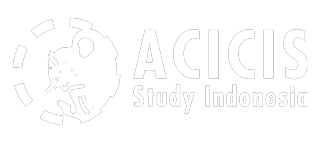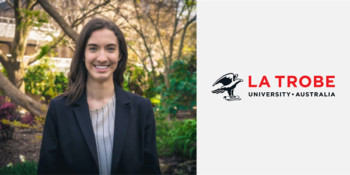Tiana Iskra was a participant in the 2021 Virtual Law Professional Practicum. Tiana is studying a Bachelor of Laws/Bachelor of Psychological Science at La Trobe University. Tiana received a $3000 New Colombo Plan mobility grant to support her participation on this program.
Q: Why did you decide to undertake the ACICIS program?
The ACICIS Law Professional Practicum has been on my radar for the past two years. I will graduate from a Bachelor of Laws/Bachelor of Psychological Science this year and the COVID-19 pandemic meant that I could only complete a virtual program. Indonesia is a beautiful country with a rich history and I have wanted to learn Bahasa Indonesia for a while. Hence, the Virtual LPP provided a fantastic opportunity to engage with Indonesia despite the pandemic.
Q: Did you receive a New Colombo Plan Mobility Grant? Do you think the NCP is an important initiative?
Yes, I received a New Colombo Plan Mobility Grant. I am incredibly passionate about the NCP program and its aim to engage Australian undergraduate students with the Asia-Pacific region through study, internship and language opportunities. In 2019, I applied for the NCP Scholarship Program and got to the final stage interview in Canberra. I then received an NCP Mobility Grant for the Reimagining India Program by Indogenius, which lead to me being selected to be in the Australian Government’s Department of Foreign Affairs and Trade NCP Shared Visions Podcast. The new Virtual NCP Mobility Grant was an opportunity that I couldn’t pass up and it has supported me to participate in the ACICIS Virtual Law Professional Practicum.
Q: How have you found the academic components of this virtual program – i.e. the language classes/seminars?
The seminars and tutorials were very interesting. They covered a wide range of legal and political topics that deepened our understanding of Indonesia’s legal context. The tutorials were a great way to ask questions of the tutors and learn from the other students. Similarly, the language classes were engaging and interactive. Our teacher supported us to learn Bahasa Indonesia in the six weeks. I was surprised at how much I picked up in the short amount of time.
Q: What organisation are you interning with?
I interned with the Center for Human Rights at the Universitas Islam Indonesia (PUSHAM UII). My host organisation gave me the freedom to do a research project on any topic of my choice. I chose to research the different human rights projects currently being conducted by PUSHAM UII. The second half of my report focused on the ‘barriers faced by people with disabilities in Indonesia’s legal system and how Indonesia can overcome these barriers’. The project involved interviewing some of the PUSHAM UII staff members and researching the current laws and issues for people with disabilities in the legal system.
Q: How have you found the work culture (albeit online) of your host organisation? How is it different to work experience in Australia?
The virtual setting still allowed me to engage with the staff at PUSHAM UII. I was not able to participate in the staff meetings because they were in Bahasa Indonesia. However, the staff were incredibly welcoming and provided me with in-depth information about their research projects. It is difficult to compare the work culture to Australia because each work setting is different. The culture at PUSHAM UII was very relaxed, welcoming and supportive.
Q: What are the main skills you have learnt during your virtual internship?
The research project required me to complete research independently, adapt my communication skills due to the language barrier, build trust and develop a rapport with the staff over Zoom.
Q: What did you find to be the most rewarding part of this virtual experience?
The most rewarding part of the virtual program was being able to engage with Indonesia’s legal system on a multi-dimensional level during the COVID-19 pandemic. The language classes assisted with the internship and the seminars/tutorial provided a well-rounded view of Indonesia’s legal and political culture. These skills will help me with future engagement with Indonesia, both in-person and online.
Q: Were you able to learn about the Indonesian culture from this virtual program? If yes, how was this achieved?
The level of engagement with the staff and other students was incomparable. It was great to learn about the daily life of the ACICIS staff and the staff at PUSHAM UII. We could openly ask questions about Indonesian culture throughout the program. One question that was regularly asked was ‘Apakah Anda suka makan? (Have you eaten yet?)’, which demonstrated the level of hospitality and care in Indonesian culture.
Q: How will the virtual internship benefit or influence your future career?
The internship provided me with the opportunity to engage with Indonesia’s human rights sector in a virtual setting. ACICIS allowed me to venture further into the Asia-Pacific region by seeking out a credit-based internship that I would not have sought out until I graduated university. The combined knowledge of Bahasa Indonesia and the internship experience broadened my engagement with Indonesia. I would like to continue studying Bahasa Indonesia and to engage with the Asia-Pacific region after I graduate.
Q: Would you recommend this virtual program to your friends?
Absolutely! The program was a great way to combine Indonesian language classes, law seminars/tutorials and an internship at a relevant host organisation in Indonesia. The staff made the classes very engaging and I thoroughly enjoyed my time during the program.
Q: Favourite Indonesian word/phrase:
Saya suka minum kopi (I like to drink coffee) and terima kasih (thank you)!
Q: Describe your experience of the virtual internship program in three words:
Engaging, stimulating and interactive.


